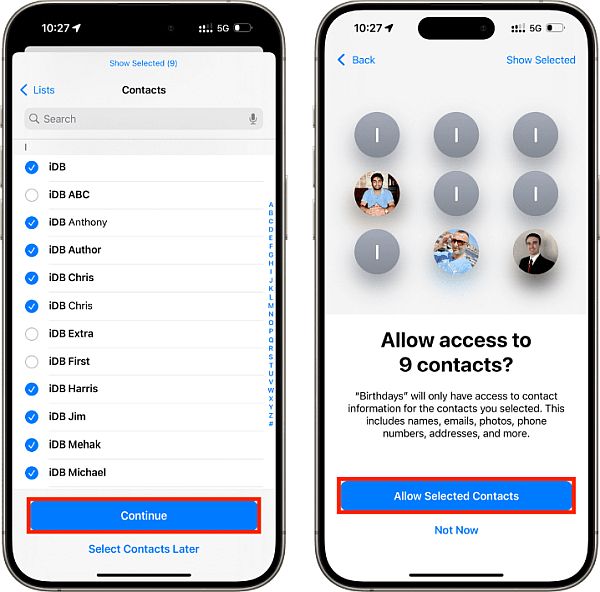Some app makers worry that subtle changes to the iPhone’s connection sharing permissions could make it difficult for them to grow quickly to compete.
This year, when Apple announced the latest version of its mobile operating system, iOS 18, most attention was paid to the new artificial intelligence features. But iOS 18 has a less-heralded change, a tweak to a feature that lets users share their contact list with different apps. “Contact syncing,” as some developers call the feature, has played a critical role in the growth of many social and messaging apps over the past two decades.
This is how apps like Instagram, WhatsApp and Snapchat gained a foothold by quickly connecting millions of iPhone users with people they already know and suggesting other users to follow. This early momentum helped launch their viral growth and catapulted them to the top of the App Store charts. Now, some developers are worried that they will struggle to launch new apps. Nikita Bier, a startup founder and consultant who has created several apps aimed at young people, called the iOS 18 change “the end of the world” and believes new social apps based on friends “could be dead at launch.”
That might be a bit of an exaggeration, but there’s no denying that it’s a difficult situation for a developer trying to create a new social app these days. The connection sharing changes in iOS 18 will undoubtedly make it harder for novice apps to break through. And in a world where it’s harder for smaller apps to gain traction, giants like Facebook and Instagram — which already have network effects and don’t need to ask permission from existing users to keep harvesting their connections — clearly have an advantage. .
However, Apple believes that giving users more control over shared connections is good for privacy. They think apps that ask users to hand over their entire contact list can be creepy and intrusive. The drama is mostly that it shows how powerful gatekeepers like Apple have become, and how even the tiniest changes to their products can send dramatic ripples through the rest of the tech industry. It also illustrates the trade-offs that technology companies and regulators struggle to make while promoting competition and protecting privacy.
Contact sharing on iOS devices has worked for years by allowing an app to display a message called a “data access request” requesting access to a user’s contacts. If the user consents, the application developer receives all the contacts in that user’s address book, as well as other information stored on the user’s business cards, such as phone numbers and email addresses. App developers can then use this information to build the user’s social graph or suggest other accounts for the user to follow.
However, in iOS 18, users who agree to allow an app to access their contacts will receive a second message to choose which of their contacts to share. Users can choose to share only a handful of contacts, selecting them one at a time, rather than handing over their entire address book. Apple’s reasoning for these changes is simple: users shouldn’t have to choose all or nothing. Many users have hundreds or thousands of contacts on their iPhone, including some that they would rather not share. For example, your doctor, your ex-girlfriend, or an old classmate you don’t want to contact again. For years, iOS has allowed users to give apps selective access to their photos; why not apply the same principle to their contacts?

Apple also made it clear that it doesn’t think the iOS 18 changes will hurt app developers. What’s more, the company says, developers may even see an uptick in contact sharing if users who previously would have rejected contact sharing can now share only the contacts they want. According to the app developers, this is a false argument. According to Bier, data from startups shows that contact sharing has decreased significantly since the changes in iOS 18 went into effect, and that for some apps, the number of users sharing 10 or fewer contacts has increased by as much as 25 percent. Other developers have experienced similar declines in their own applications.
A 25 percent drop in contact doesn’t seem like much of a change. But for social apps, the ability to quickly connect new users with their friends can mean the difference between success and failure. For example, Facebook discovered in the early days that if users added seven friends within 10 days of signing up for an account, they were more likely to remain users than those who didn’t. “Density is critical for an early-stage app,” Bier said. “People aren’t waiting a week for all their friends to sign up.”
Some developers have also pointed out that the changes in iOS 18 do not apply to Apple’s own services. For example, iMessage does not require permission to access users’ contacts, as WhatsApp, Signal, WeChat, and other third-party messaging apps do. This is seen as fundamentally anti-competitive – a clear example of the kind of self-referencing that antitrust regulators have already objected to in other contexts. Of course, iPhone users can still upload their entire address book if they choose. And Android still requires users to choose all or nothing.
It’s fair to assume that people will share fewer contacts because of the second selection screen. According to Bier, the result could be that friends-based social apps will simply be replaced by apps like TikTok that show users content based on what they like rather than who they’re connected to, or social apps like MI , which do not require humans at all. “Even now, you have to be pretty crazy to make a friend-based social app,” he said. “It’s going to be almost impossible.”
Source: sg.hu


